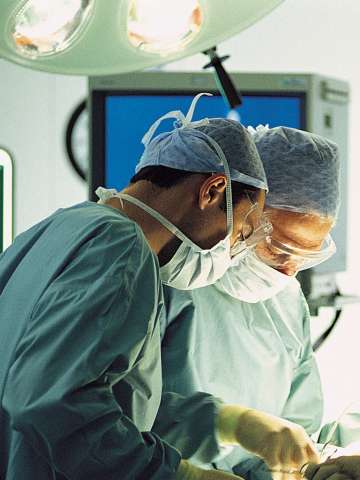Bariatric Surgery
Our bariatric surgeons offer expert weight loss treatment that promotes exceptional outcomes.

Why choose UCLA Health for weight loss surgery?
At UCLA Bariatric Surgery, we offer surgical treatments for sustained weight loss. With every treatment plan, our goal is to improve your quality of life.
We have been treating patients for obesity and obesity-related conditions for more than a decade. We use a comprehensive approach, through which you receive all the services you need in one program. Highlights of our bariatric surgery services include:
Exceptional outcomes: Bariatric surgeries are among some of the safest procedures, thanks to advanced techniques and strict quality measures. Our patients report a surgery satisfaction rate of greater than 95%. Compared to the national average, our surgeons perform 50% fewer revision operations and our patients have a 24-hour shorter hospital stay.
Advanced technology: We equip our operating rooms with the latest technology. For example, we have two da Vinci Robotic systems, which allow surgeons to operate through small incisions with increased precision and control. Robotic and minimally invasive surgeries offer patients a lower risk of complications, less pain and faster recovery times.
Extensive patient support: We offer free informational seminars and organized programs to educate patients and their family members about bariatric surgery and weight management. You may work with a dietitian, connect with a psychologist or join one of our support groups.
Comprehensive team approach: Because obesity is associated with many conditions, you may need more than one specialist on your treatment team. Our program includes experts in bariatric surgery, hepatology (the study of liver disease), cardiology, gastroenterology and endocrinology.
Streamlined, convenient care: Our goal is to ensure that your time at our center is as productive and stress-free as possible. We take the time to get to know you and learn about your individual circumstances so that we can write a treatment plan that best meets your needs. When you have an appointment at our center, you can visit every subspecialist you may need.
What is bariatric surgery?
Bariatric surgery, also known as weight loss surgery, helps you lose weight by removing or rerouting a portion of your stomach. The surgery limits the amount of food you can eat or the amount of calories your body can absorb. Research has shown that bariatric surgery can help you lose up to 85% of excess weight.
These types of procedures have also been shown to:
- Control high blood pressure
- Improve sexual dysfunction
- Increase fertility
- Increase life expectancy
- Provide pain relief
- Treat conditions such as type 2 diabetes and sleep apnea
Our areas of care
Our Bariatric Surgery Program offers a range of weight loss and weight management services. Areas of care at our bariatric clinics include:
Adolescent bariatric surgery: The American Society of Metabolic and Bariatric Surgery recommends bariatric surgery as a treatment for some obese adolescents. These guidelines are based on recent data about the rising rate of childhood obesity and the effectiveness of weight loss surgeries. If adolescents have a body mass index (BMI) higher than 35 and another condition related to obesity, they may be candidates for weight loss surgery.
Healthier Weight Management Program: This eight-week series educates participants about lifestyle modifications for long-term weight maintenance. Each week, a physician or specialized dietitian addresses a different factor that affects weight, such as nutrition, exercise or stress.
Medical Weight Management Program: We use a holistic approach that assesses every element that affects weight loss. These elements might include environmental, metabolic, genetic or social factors. Treatment through this program may include an individualized diet plan, medically supervised weight loss or group cognitive behavioral therapy classes. Because we understand that weight maintenance is just as important as weight loss, we also offer a program for long-term weight management.
Weight loss surgery: Our bariatric surgeons use advanced technology and gold-standard techniques for several types of weight loss surgeries. Our outcome and satisfaction rates are consistently higher than the national averages. We even offer revision surgeries for patients who had unsuccessful weight loss surgery in the past.
Obesity-related conditions we treat
The primary goal of bariatric surgery is to treat obesity. Obesity is a medical condition in which you have excess body fat. You are most likely considered obese if your BMI is 30 or higher.
Bariatric surgery can also be part of your treatment plan for a range of obesity-related conditions, including:
- Diabetes: A disease that affects how your body processes blood sugar.
- Fatty liver: Fat buildup in the liver (the organ that digests food and gets rid of toxins).
- Hyperlipidemia (high cholesterol): When there are high levels of fat particles in your blood.
- Hypertension (high blood pressure): When the pressure against your artery walls is chronically too high.
- Osteoarthritis: A degenerative disease in which cartilage (the flexible tissue that cushions between your bones) wears down.
- Polycystic ovary syndrome: A hormonal imbalance that can lead to small cysts on the ovaries.
- Sleep apnea: A sleep disorder characterized by breathing stopping and starting throughout the night.
Treatments bariatric surgeons offer
We use advanced surgical techniques, including minimally invasive techniques, to offer every patient expert care. Surgeries we offer include:
Anti-reflux surgery: Many obese patients also have gastroesophageal reflux disease (GERD). Research has shown that gastric bypass surgery not only treats GERD, but also effectively treats conditions related to obesity, such as diabetes or fatty liver.
Gastric bypass: During gastric bypass, your surgeon reduces the size of your stomach by dividing and reconnecting your small intestine. This technique restricts the amount of food your stomach can hold and changes your gut hormones to help you feel full longer.
Gastric bypass revision: About 15% to 35% of patients regain weight or fail to achieve weight loss after surgery. We can perform a procedure called distal gastric bypass to help you lose more weight after a previous failed procedure.
Gastric sleeve: Also called sleeve gastrectomy, this procedure removes up to 80% of the stomach. It is the most common type of weight loss surgery in the United States and has up to a 90% success rate.
Lap band removal: Lap band surgery works by placing an inflatable silicone band around part of your stomach. This procedure used to be the most popular weight loss surgery, but many patients experience complications or poor results. We perform a procedure to revise a lap band to a gastric sleeve or gastric bypass. Patients who have this operation experience significant weight loss and improved quality of life.
Our expert bariatric clinic team
Our weight loss surgery team offers compassionate, comprehensive, advanced care. We use the latest techniques and our patient outcomes are consistently better than the national average.
Contact us
Call to request an appointment with a bariatric surgeon at UCLA Health.
Find your care
Our bariatric surgeons use a range of treatments to help you reach weight loss goals and optimize your health. To learn more, call .
